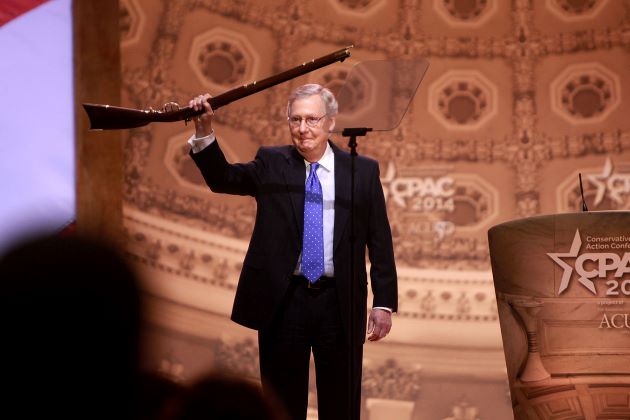J. Pharoah Doss: Long games and long shots
by J. Pharoah Doss, For New Pittsburgh Courier Republican Senate Leader Mitch McConnell’s published memoir has a strategic title: The Long Game. Last month, a Fox News contributor bragged about how well Mitch McConnell played the long game to create a conservative majority on the Supreme Court. McConnell’s long game began after the death of … Continued The post J. Pharoah Doss: Long games and long shots appeared first on Atlanta Daily World.


by J. Pharoah Doss, For New Pittsburgh Courier
Republican Senate Leader Mitch McConnell’s published memoir has a strategic title: The Long Game. Last month, a Fox News contributor bragged about how well Mitch McConnell played the long game to create a conservative majority on the Supreme Court.
McConnell’s long game began after the death of Supreme Court Justice Antonin Scalia in 2016.
President Obama nominated Merrick Garland, the Chief Justice of the US Court of Appeals for the DC Circuit, to replace Scalia. McConnell insisted that the next president, with the mandate of the voters, should fill the vacant Supreme Court seat, not the outgoing president whose party lost the House and Senate during his two terms in office.
At least, that’s what McConnell told the public.
His long game was predicated on a political forecast that suggested the same red wave that won the Republicans the house in 2010 and the Senate in 2014 would win the Republicans the White House. McConnell successfully blocked Obama’s attempt to replace Scalia, and the Republicans won the presidency.
McConnell’s long game worked out better than he anticipated.
The Republican president ended up filling not one but three vacancies on the Supreme Court, and the newly-appointed Supreme Court justices were responsible for overturning Roe v. Wade.
Once the Supreme Court became conservative, the progressive wing of the Democratic Party campaigned to expand the number of justices on the Supreme Court in a desperate attempt to regain the majority. President Biden went on the record against packing the court, but after Roe v. Wade was struck down, the Democrats decided to retaliate against McConnell’s long game with a long shot.
A group of House Democrats recently introduced TERM, the Supreme Court Tenure Establishment and Retirement Modernization Act. The act proposes that after presidential elections presidents can only appoint justices in their first and third years in office, and justices confirmed through this process will have to retire after eighteen years.
The sponsor of TERM explained the bill was drafted because “Five of the six conservative justices on the bench were appointed by presidents who lost the popular vote, and they are now racing to impose their out-of-touch agenda on the American people.”
The sponsor of TERM also said term limits were a necessary step toward restoring balance on the majority-conservative court.
This explanation makes the sponsors of TERM sound like pouting sore losers, not champions of much-needed change. If TERM’s sponsors wanted to appear principled, they should have packed their proposal with congressional term limits.
That could have restarted the Term Limit Movement from the early 1990s.
During an interview in 1987, a first-term Senator named Mitch McConnell was asked about increasing public demand for congressional term limits. McConnell said in most professions, the longer you’re in, the more you know. The same principle applies to congress. So, it doesn’t make sense to throw legislators out after they’ve become most effective.
Regardless of McConnell, the Term Limit Movement marched forward.
According to ThougtCo., Senators and Representatives from 23 states faced term limits from 1990 to 1995. In 1995 the Supreme Court killed the Term Limit Movement in U.S. Term Limits, Inc. v. Thornton, by declaring states could not impose congressional term limits because the constitution didn’t grant the states the power to do so. That same year, The Citizen’s Legislation Act was brought to the House floor for a vote. This was a proposed amendment to the US Constitution that set 12-year congressional term limits, two terms for Senators and six terms for Representatives.
The Citizen’s Legislation Act didn’t pass. It had the majority of votes 227–204, but it didn’t have the two-thirds majority required for a constitutional amendment.
In 2017, three decades after McConnell’s 1987 interview, he was asked about term limits again. McConnell said, “We have term limits. They’re called elections.” Then after Roe v. Wade was struck down, McConnell told reporters, regarding the Supreme Court and his focus on the federal judiciary in the Senate, “I think it’s the most consequential contribution I’ve been able to make to my country in the course of my career.”
We all heard the phrase “elections have consequences”, but the consequences of congressional elections without term limits are career politicians who have unlimited time to plan long games and take long shots.
The post J. Pharoah Doss: Long games and long shots appeared first on Atlanta Daily World.







